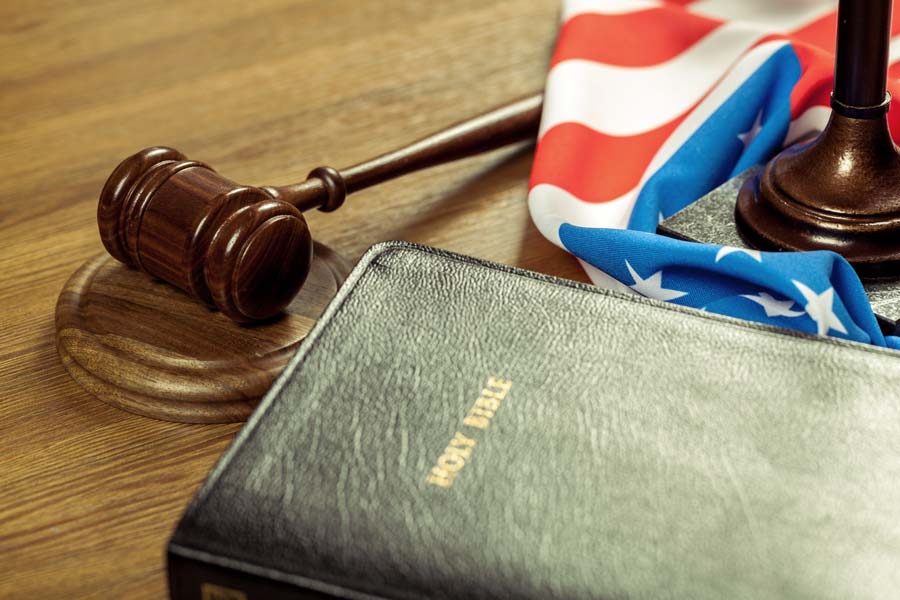
Liberal justices seemed particularly worried that lawyers for the Trump administration and Catholic schools were greatly expanding the definition of those who performed important religious functions and thus would not be protected by the law.
"The breadth of the exemption is staggering," said Justice Ruth Bader Ginsburg. She seemed shocked by the facts of one of the cases before the court: Teacher Kristen Biel, who has since died, said she did not have her contract renewed at a Los Angeles-area parochial school after telling the principal she had breast cancer.
Ginsburg, a cancer survivor, added: "What I find very disturbing in all this [is] that the person can be fired or refused to be hired for a reason that has absolutely nothing to do with religion, like needing to take care of chemotherapy."
The school disputes that is why Biel was not retained. But its lawyer, Eric Rassbach of the Becket Fund for Religious Liberty, said the Constitution guarantees religious organizations the right to decide who teaches the faithful without second-guessing from government.
"If separation of church and state means anything at all, it must mean the government cannot interfere with the church's decisions about who is authorized to teach its religion," he said. "In this country, it is emphatically not the province of judges, juries or government officials to decide who ought to teach Catholic fifth-graders that Jesus is the son of G od or who ought to teach Jewish preschoolers what it means to say, 'Hear, O Israel, the Lord your G od, the Lord is one.' "
Biel's estate is suing under the American with Disabilities Act, and another teacher, Agnes Morrissey-Berru, said she was let go because of her age. A divided U.S. Court of Appeals for the 9th Circuit said neither was covered by the ministerial exception and their lawsuits could continue.
Stanford law professor Jeffrey Fisher, representing the teachers, told the high court to be wary of what the schools and the Justice Department were requesting.
"The school's argument would strip more than 300,000 lay teachers in religious schools across the country of basic employment law protections and necessarily included in this number are teachers who teach so-called secular classes," Fisher said.
In the high court's 2012 decision recognizing the exception, the justices said lower courts should examine a number of issues to determine where an employee fit: the employee's title, whether the organization considered the employee a minister, whether the employee considered herself a minister and whether the employee's duties included "important religious functions."
Rassbach and Justice Department attorney Morgan Ratner said the last will likely be the most important. "The touchstone of the ministerial exception should be whether an employee performs important religious functions," Ratner said. Conservative justices seemed to be in sync with the argument. Justice Clarence Thomas, who in a separate opinion in the 2012 case urged deference to the religious organization, said sorting employees is not for the courts.
How would it determine between a teacher who is a nun, and all would agree is covered, and a lay teacher who conducted her class in a parochial school in an identical way, he asked.
Justice Elena Kagan said she was struck by the government's argument that an employee would not need to be a member of the faith for the ministerial exception to apply.
"If a position can be filled by any old person, not by a member of a faith, isn't that a pretty good sign that the employee doesn't have that special role within the religious community?" she asked.
But Justice Samuel Alito indicated that he felt almost all teachers at religious schools would qualify.
"For a school that is set up by a religious body, the teaching of religion is central," Alito said. "That's the very reason why these schools are set up. Otherwise, there would be no reason."
The cases are Our Lady of Guadalupe School v. Morrissey-Berru and St. James School v. Biel.
The court for the second time also considered whether a large portion of eastern Oklahoma remains an American Indian reservation, which has major implications for criminal prosecutions in the state.
The court heard a similar argument last term, with Justice Neil Gorsuch recusing himself because he had confronted the case as a lower-court judge. Apparently deadlocked, the justices took a new case, so Gorsuch seems likely to cast the deciding vote.
The land at issue contains much of Tulsa, the state's second-largest city, and about 1.8 million people. The question is whether Congress officially eliminated the Creek Nation reservation when Oklahoma became a state.
The case is brought by Jimcy McGirt, who was convicted in state court of molesting a child. Because the crime occurred on the land in question, McGirt said state courts have no jurisdiction and the federal government would have to prosecute.
The state said that there are thousands of similar cases and that a ruling in favor of McGirt would cause havoc in the criminal justice system.
But Gorsuch, who in the past has shown a keen interest in Indian law, questioned the "parade of horribles" that the state advanced.
Ian Gershengorn, representing McGirt, said the concerns were overblown. But they also should not factor into the court's study of the law and treaty.
"Congress knows how to do this, and the job to fix any consequences if the court perceives them is with Congress," he said.
The case is McGirt v. Oklahoma.


 Contact The Editor
Contact The Editor
 Articles By This Author
Articles By This Author